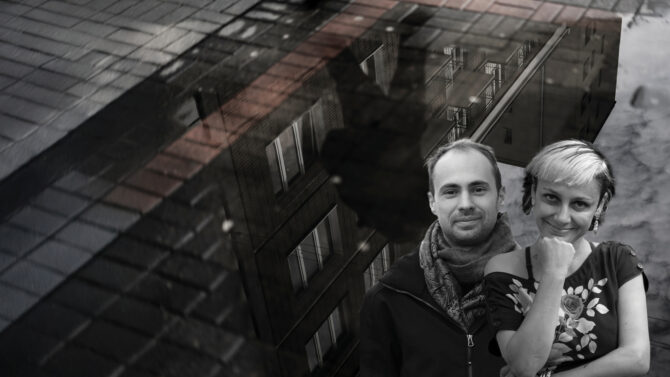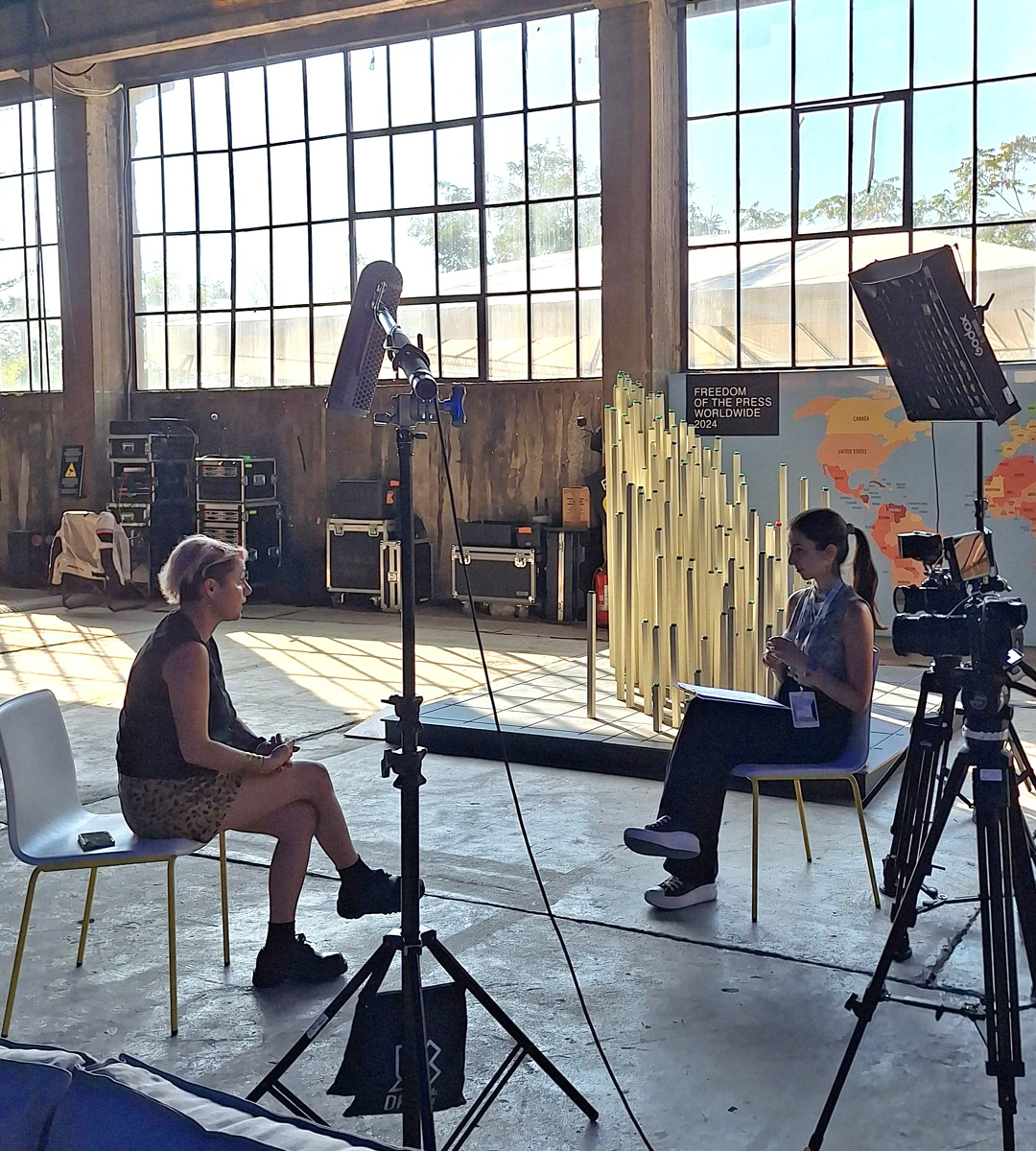Elena Ledda, an independent journalist based in Barcelona, talked with iMEdD about the need for a healthy work-life balance, the significance of cross-border collaboration and the challenges of bringing a feminist perspective into reporting, during the iMEdD International Journalism Forum 2024.
“How to go undercover” with independent journalist Elena Ledda and investigative reporter Nikolai Atefie

Kabir Jugram, journalism student at the University of the Witwatersrand met with independent journalist Elena Ledda and investigative reporter Nikolai Atefie during the 2024 iMEdD International Journalism Forum in Athens and discussed the challenges of reporting undercover for the Forum’s pop-up newsroom.
Maintaining well-being at work
“I strongly believe that we are not as important as our job,” was Ledda’s first take on journalists’ work-life balance “but we are more important than our job, because we are the most important people in our lives.” The idea that we are our job is misleading for Ledda who believes “it only benefits capitalism”, adding that time is one of the most important resources we have, therefore we should use as much we can for ourselves and for the people we love. As far as time management at work is concerned, she also suggested a few tips, such as doing one thing at a time, not using one’s phone and social networks while working and taking breaks, based on the principle that the human ability to concentrate for a prolonged time is limited.
“When we take the time to really see how we’re feeling,” explained Ledda, “we recognize the root causes of our anxiety and stress. This means that when it turns out that I have anxiety because I cannot pay my rent, then perhaps mindfulness is not enough.” According to Ledda, the precariousness and financial insecurity of the journalism profession is one of the main causes of poor mental health among journalists. In this case, “I might need to get together with others and ask for changes in how we work so that we can work more sustainably.”
Most often the problems that we face in terms of our mental wellbeing are related to structural problems. So, we also need structural solutions.
Elena Ledda, independent journalist
“A huge resource” in community and collaboration
Finding a community amongst colleagues and working together is one of the main points Ledda made on the subject of fighting the neoliberal mindset of the “lone wolf” reporter.
“Most often, the problems that we have in terms of our mental being, are similar to our colleagues, and if we share them, we don’t feel as alone. We can also ask for changes from those who make decisions, such as the government, trade unions, or our bosses, because most often the problems that we face in terms of our mental wellbeing are related to structural problems. So, we also need structural solutions.” Ledda also highlighted the ability of journalists to share resources with colleagues and to empower one another. “If you look at the others and see potential enemies, then that doesn’t work”, Ledda said, “but if you see them as allies, a community of journalists becomes a huge resource.”
However, community building, and cross-border collaboration do not come without challenges. “We don’t know how to take care of processes, how to resolve conflicts, how to make sure everyone is happy and feels part of the project”, commented Ledda, adding that “the balance between taking care of the process and taking care of the product and the deadline we need to meet is a huge challenge”.
Another difficulty is that roles are not always clear when it comes to cross-border collaborations. Contrary to newsrooms, where the hierarchy, the deliverables and the deadlines are mostly clear, cross-border collaboration between independent journalists can bring differences between colleagues to the fore. “It’s difficult. Who has the legitimacy to decide what to say and what to require? And if you end up – like I did – being both a project coordinator and a team member, it is not often clear what hat you are using. Am I insisting this should be done as a team member or am I the coordinator? And I’m suggesting an ultimate decision, because there is no agreement. And this legitimacy isn’t built in itself.” All this suggests that the most important part of this kind of collaboration is the human factor and the smooth cooperation between different personalities. Ledda points out that no matter how difficult collaboration is, professional journalists will get the job done and publish. However, it is important to take into account what happens in the meantime and to pay attention to people’s feelings, whether they are frustrated and end up burnt out or whether they have been given the space they deserve.

If we balance our energies in two places, there are more possibilities that we achieve what we want. And when we don’t put all the pressure in one thing, we get less frustrated.
Elena Ledda, independent journalist
Feminist perspective
Bringing a feminist perspective into the narrative is not always an easy task, according to Ledda, since trying to explain complex trauma-related issues deriving from gender-based violence can impose a great toll on journalists’ wellbeing. This applies especially to those who have been socialized as women, since almost all of them have faced some sort of gender-based violence and, therefore, they can relate more easily to it.
“When we try to cover and do investigative reporting with a feminist perspective, it often takes a lot of time and it’s difficult to sell because sometimes outlets just take March 8th (the International Women’s Day) and few similar dates to cover women’s issues”, added Leda pointing out the financial insecurity that comes with long-term reporting on gender issues. This precariousness can prevent journalists from pursuing such stories, threatening not only their wellbeing, but also their ability to continue their job.
Ledda highlighted that although this kind of precariousness is the reality for women living in the Western world, the situation is more complicated in countries like Mexico, where journalists may face physical threats when they decide to report on gender-based violence.
Paving the way forward
Ledda acknowledged that “I know how easy it is to give advice and then how difficult it is to implement it ourselves”, when asked to give advice to young journalists. Yet, if she were to share a personal success story it would be that “most of us are very good at two things in life that make us happy. I have found my two things: I am happy when I write, but I’m also happy when I coordinate”. She continued explaining that “in this competitive work and world, it’s really frustrating and competitive if we think we’re going to be the best ones in one thing. There’s always going to be someone doing better than us, such as publishing before us, covering our story, getting that prize, etc.” For this reason, Ledda concluded by suggesting that “if we balance our energies in two places, there are more possibilities that we achieve what we want. And when we don’t put all the pressure in one thing, we get less frustrated.”